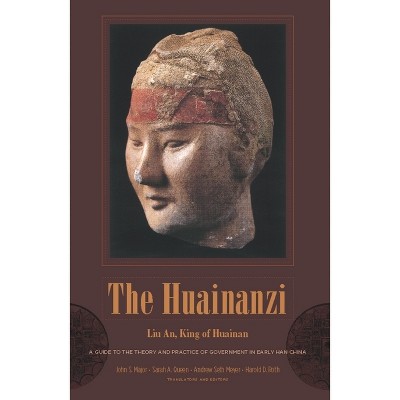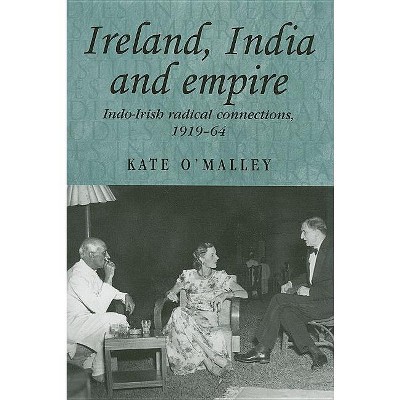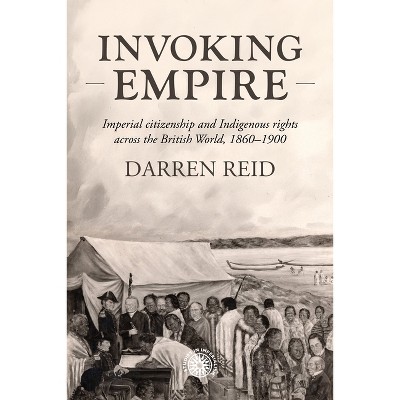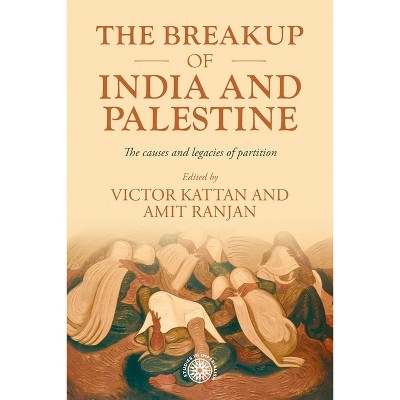Sponsored

The Interpreters - (Studies in Imperialism) by Georgios Giannakopoulos (Hardcover)
In Stock
Sponsored
About this item
Highlights
- The book offers a new interpretation of the cultural and intellectual exchanges between Britain and southeastern Europe in an age of imperial transformation.
- About the Author: Georgios Giannakopoulos is Senior Lecturer in Modern History at City St George's, University of London
- 304 Pages
- History, Europe
- Series Name: Studies in Imperialism
Description
About the Book
This book analyses British attitudes on southeastern Europe in the period between 1870-1930.Book Synopsis
The book offers a new interpretation of the cultural and intellectual exchanges between Britain and southeastern Europe in an age of imperial transformation. It considers systematically the question of the management of ethnic difference in multinational imperial states as diverse as Britain, Austria-Hungary and the Ottoman Empire. It traces the regional experiences and impact of British scholars and public intellectuals steering through competing nationalisms and translating regional national questions to British and international audiences. The emphasis on past attempts to reconcile liberal democracy and nationalism with imperial rule continues to resonate in our day as intellectuals confront the challenges presented the rise of ethno-nationalist politics and shifting place of Britain in Europe.From the Back Cover
'This important new study shows the connections between the national question in southeastern Europe and British imperialism. It helps explain why internationalism took the form that it did after the First World War and how that mattered to both Britain and southeastern Europe.' Michelle Tusan, Professor of History at the University of Nevada, Las Vegas
'The interpreters offers a fascinating group portrait of the individuals who shaped Western perception of southeastern Europe. With a sharp eye and keen sense for historical convergence, Giannakopoulos shows how these nineteenth-century British intellectuals formed and changed their own views of the region through contact with its people and artifacts, as well as through their often-intimate personal relationships with one another, and in relation to the geopolitical aspirations and fantasies of Great Britain.' Holly Case, Brown University 'The interpreters is a vivid story and a sobering history of a series of gross misunderstandings. While meticulously following British intellectuals on their real and virtual travels to Southeastern Europe, and interrogating how this raw material of knowledge was conceptualized and translated for a British and international audience, the book reveals more than a history of how political ideas and personal political preferences interact with academic scholarship. ' Gábor Egry, Columbia University This book offers a new interpretation of the cultural and intellectual exchanges between Britain and southeastern Europe in the period between 1870-1930. It tells the story of a group of scholars - the interpreters - caught in an age of clashing nationalisms and internationalisms. The volume records their search for political order in moments of crisis, and highlights their commitment to imperial 'solutions' in a world spinning into violence and ethnic contention. The interpreters is also about how these scholars connected national communities in the hot spots of southeastern Europe and the Balkans with Britain's policy makers, and how they framed national questions as international problems requiring imperial solutions.Making uses of sources from state archives, individual paper collections, newspapers and magazines across Britain and southeastern Europe, the book connects the study of the British empire with the politics of central and southeastern Europe.
Review Quotes
'This important new study shows the connections between the national question in southeastern Europe and British imperialism. An intellectual history of the development of liberal views on the minority question, it helps explain why internationalism took the form that it did after the First World War and how that mattered to both Britain and southeastern Europe.' Michelle Tusan, Professor of History, University of Nevada, Las Vegas
'The Interpreters offers a fascinating group portrait of the individuals who shaped Western perception of southeastern Europe. With a sharp eye and keen sense for historical convergence, Giannakopoulos shows how these nineteenth-century British intellectuals formed and changed their own views of the region through contact with its people and artifacts, as well as through their often-intimate personal relationships with one another, and in relation to the geopolitical aspirations and fantasies of Great Britain. Their interpretations are clearly still with us, making it all the more important to apprehend their origins and trajectory into the turbulent twentieth century.' Holly Case, Professor of History, Brown University 'Georgios Giannakopoulos's The Interpreters is a vivid story and a sobering history of a series of gross misunderstandings. While meticulously following British intellectuals on their real and virtual travels to Southeastern Europe, and interrogating how this raw material of knowledge was conceptualized and translated for a British and international audience, the book reveals more than a history of how political ideas and personal political preferences interact with academic scholarship. The most captivating in Giannakopoulos' story is how frequently his actors erased the boundaries between the conditions they have found on the ground and what they saw at home, in Britain, how often they talked of a distant region in order to intervene in debates about Britain's imperial present and future, and how easily they aligned their material with the necessities of their argument to achieve their favoured goal at home. But beyond this sobering - and simultaneously liberating - implicit portrait of politically engaged intellectuals, The Interpreters also turns the table on Britain and its imperial glory in the late 19th and early 20th centuries. After all, arguments derived from the conditions of a region which was seen to be in a permanent crisis could only have been deployed in Britain if its own conditions were anything but glorious, rather critical.' Gábor Egry, Columbia UniversityAbout the Author
Georgios Giannakopoulos is Senior Lecturer in Modern History at City St George's, University of LondonShipping details
Return details
Frequently bought together


Trending Non-Fiction















